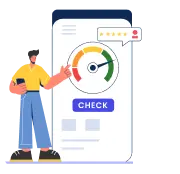Property tax is the recurring charge that is levied on real estate properties every year. The Greater Chennai Corporation (GCC) is entrusted with the responsibility of collecting the property tax in Chennai.
GCC calculates the Annual Rental Value (ARV) of a property using the Reasonable Letting Value (RLV) method. The calculated ARV of a property falling in the jurisdiction of GCC is used to compute half yearly tax. The GCC has divided chennai into 15 zones based on the location of the properties. Click here to find out the zone in which your property is listed as per the GCC regulations.
It is to be noted that in 2017, the GCC was slammed by the Madras High Court for its failure in making timely revisions to the property tax which caused a huge losses to the exchequer. The GCC was expected to revise the property tax every four years since 2002. The court estimated the loss of about Rs.1500 crore due to the negligence. Following the verdict, last year in 2018, the state government finally gave its nod to the municipal corporation of Chennai to hike the property tax. Thereafter, the municipal corporation issued the order to revise the property tax by not more than 50% for residential properties and by not more than 100% for non-residential properties.
GCC Property Tax Computation
Property Tax = Annual Value * Tax Rate
The GCC takes the following factors into consideration for calculating the property tax :
- Plinth Area (Built Up Area)
- Basic Rate : Determined by the GCC based on the location of the property.
- Usage Factor : Residential or Non-Residential
- Occupancy Factor : Self-owned or Rented
- Age Factor
First, The Monthly Rental Value is computed based on the basic rate per sq.feet which in turn is fixed by the municipal corporation.
Monthly Rental Value (MRV) = Plinth Area * Basic Rate
The basic rates are as follows :
| Property Type | Basic Rates (Rs.) Per Sq. Feet |
| Residential | 0.60-2.40 |
| Non-Residential | 4-12 |
Annual Rental Value = MRV * 12 = Plinth Area * Basic Rate * 12
Example: Let’s assume the plinth are to be 100 sq.feet and basic rate Rs.1. Then,
MRV = 100 * 1 = 100
| Annual Rental Value (ARV) | 100 * 12 = 1200 |
| ARV of Building Only (deduct 10% from ARV attributable to value of land) | 1200 – 120 = 1080 |
| Deduct depreciation on Building @ 10% | 1080 – 108 = 972 |
| Annual Value of Land and Building (Depreciated value of building plus 10% value that was attributable to value of land) | 972 + 120 = 1092 |
From the above example it is clear that 10.92 is the multiplicative factor for calculating the annual value of the building. Therefore, you can simply multiply the Monthly Rental Value with 10.92 to arrive at annual value of the property.
GCC Property Tax Rates
| Annual Value | Half Yearly Tax Rate |
| Rs.1 to Rs.500 | 3.75% |
| Rs.501 to Rs. 1000 | 6.75% |
| Rs.1001 to Rs. 5000 | 7.75% |
| Rs.5001 and above | 9% |
Note : It is to be noted that a 10% library cess shall be applicable over and above the general half yearly tax as per the rules of the Chennai Municipal Corporation.
However, the simplest and the most accurate method to calculate the property tax is through the online property tax calculator available on the GCC’s website. Here, you need to simply fill in some basic details related to the type of the building, number of floors, occupancy, and location.
Property Tax Payment (Online)
- Go to the Great Chennai Corporation’s website by clicking here
- Click on the ‘Online Civic Services’ option available in the right hand bar
- Click on ‘Property Tax’ and then on the ‘Property Tax Online Payment’
- Enter the property location details along with the Property Bill No. which can be found on the property receipt of last year. Click on ‘Submit’
- You can pay the property tax using your credit card or debit card or through net banking by choosing ‘Pay Online’ option.
Property Tax Payment (Offline)
You can also make the property tax payment by drawing a cheque/demand draft in favour of ‘The Revenue Officer, Corporation of Chennai’ and submit the same at any of the following locations :
- Authorized banks which include Axis Bank, City Union Bank, Canara Bank, HDFC Bank, IDBI Bank, ICICI Bank, Kotak Mahindra Bank, IndusInd Bank, Indian Overseas Bank, Yes Bank, etc.
- Common Service Centres (E-Sewa Centres) setup by the state government. You can find the nearest CSC here.
- To the office of the revenue officer
Due Date and Rebates
Since the property tax is paid on a half-yearly basis in Chennai, the due date for the property tax payment are September 31 and March 31 of the financial year. Penalty at the rate of 1% per month will be charged for delayed payments.
- In case you own a semi permanent house, you are eligible for a 20% rebate on monthly RLV value.
- 25% rebate on monthly RLV is applicable for owner-occupied residential properties and 10% rebate in case of owner occupied commercial portion of the property.
- 1% depreciation is provided each year for buildings more than 4 years old (subject to a maximum of 25%)

